From New York to Occupy the World: Will it Work?
by Jim Fetzer
“Those who make peaceful change impossible make violent revolution inevitable.”— John F. Kennedy (1962)
Protesters at “Occupy Wall Street”
The responses to “Occupy Wall Street” have ranged from hypercritical and dismissive to completely sympathetic and supportive. Some have suggested that this is really COINTELPRO in action, while others submit that it is instead a preemptive move by the far right to undermine the public’s growing disenchantment with endless wars, bank bailouts, and the decimation of the middle class, where everyone in power appears to be going for everything they can get, no matter how catastrophic the effects upon the middle class and working families. If a single phrase were required to sum it up, we have a denunciation of insatiable greed that have led to gross abuses of the interests of the people by bankers and war-mongers, who are leaving the rest of us nearly bankrupt and almost completely powerless.
Matt Taibbi, “Why OWS is Bigger than Left vs. Right”, however, may have put his finger on the importance of what has been taking place by virtue of bringing together elements of the left and of the right in American politics. “What nobody [at the top] is comfortable with is a movement in which virtually the entire spectrum of middle class and poor Americans is on the same page, railing against incestuous political and financial corruption on Wall Street and in Washington. The reality is that Occupy Wall Street and the millions of middle Americans who make up the Tea Party are natural allies and should be on the same page about most of the key issues, and that’s a story our media won’t want to or know how to handle.” And one that poses a major challenge to the status quo. Not only the bankers and traders on Wall Street are being confronted by this movement, but those who stage manage political events in this country, from the President on down.
Some commentators have been alarmed by what they perceive to be the role taken by an organization located in Vancouver called “Ad Busters”, which has even been discussed at Above Top Secret. Those who visit their web site, http://www.adbusters.org/ will discover that they describe themselves as “a global network of culture jammers and creatives working to change the way information flows, the way corporations wield power, and the way meaning is produced in our society”, which would appear to be worthy goals. Sean Dix, who has participated in the protest a dozen days or more, has told me that he has discovered that some of those who are there with him have the destruction of capitalism on their agenda. But capitalism in our society is largely a myth today, where none of the five principles that Adam Smith specified as necessary for the “invisible hand of the free market” to operate properly are present today, including transparency in pricing to reflect the full costs of the natural resources and the labor that was required to produce a product or the free and open competition between alternative sources that is supposed to maintain market stability at the lowest price for the benefit of the consumer.
So if Ad Busters is anti-consumerism and anti-exploitative-capitalism, that does not mean they are on the wrong side of the issues. They may not appreciate that persons like Sean Dix illustrate the problems that inventors confront in dealing with corporate giants like Johnson & Johnson. Sean’s “Floss Rings” product has been estimated to be worth $250,000,000 in sales yearly and to potentially employ as many as 1,000 new workers. Yet he has been harassed by some of those who do not grasp the complexity of the situation, where instead of open and fair competition, we have crony capitalism, corporate welfare, and monopolistic practices that are well-encapsulated by the slogan, “Banks get bail outs, we get sold out!” Whether or not Ad Busters have been the force initiating the OWS movement and even if some of their supporters are incapable of recognizing the dimension of the problem represented by Sean Dix’s experiences with Johnson & Johnson, they have featured an excellent video on its world-wide spread:
http://www.veteranstoday.com/2011/10/18/from-new-york-to-occupy-the-world-will-it-work/
And those who complain that the movement has never specified its objectives appear to be on equally flimsy grounds. As “Occupy Wall Street objectives are clear” explains in a critical response to articles in the Associated Press, “A little homework as simple as checking the Occupy Wall Street website would have found that their demands include a universal single-payer health care system; guaranteed living-wage income regardless of employment; free college education; $1 trillion in infrastructure spending; $1 trillion in ecological restoration; decommissioning all of America’s nuclear power plants; open borders migration and immediate across-the-board debt forgiveness for all.” These are not objectives that promote the interests of the rich and powerful, which suggests that those who claim this movement is un-American, anti-democratic, or even COINTELPRO are seriously mistaken or completely off-base. This movement appears to be profoundly populist and egalitarian and opposed to the exploitation of the middle class and of working families for the benefit of the rich and powerful.
Is OWS actually COINTELPRO?
The most extreme response has come from Henry Mankow, “Occupy Wall Street is COINTELPRO (Phony Opposition)”, who resurrects some not-s0-ancient history regarding government abuses in the past: “COINTELPRO was the FBI acronym for ‘Counter Intelligence Program’. COINTELPRO not only infiltrated domestic antiwar and civil rights protest groups, it also created them. By 1968, the largest leading ‘counterculture’ groups were entirely FBI/CIA controlled. In fact the leading ‘Anti-Establishment’ figures of the late 60’s early 70’s were outed years later as having been double agents for the CIA.” But while there are multiple reasons across a wide range of contexts to reflect upon Lenin’s observation, “The best way to control the opposition is to lead it”, that appears to be extremely unlikely with a movement that appears to have deep roots in the American experience of the past several decades, which originated with the “supply side” economic policies of Ronald Reagan, which even David Stockman, who was his chief economic adviser, has acknowledged were intended to drive up the federal deficit to astronomical levels where the social welfare programs initiated by FDR would no longer be sustainable.
Discussing the movement on Russia Today
It was a disastrous plan that has made the rich richer and the poor poorer while concurrently undermining the strength and vitality of our nation’s economy. No one who has been following this movement, however, should take Mankow’s idea seriously. Consider the following sampler of developments related to the movement, which include the arrest of Princeton Professor Cornell West and of anti-war activist Cindy Sheehan, where even the Los Angeles City Counsel has voted unanimously to support the “Occupy LA” movement in its own community:
Arrests made after Phoenix ‘Occupy’ protests 16 Oct 2011 About 50 Occupy Phoenix protesters descended on the Fourth Avenue Jail in Phoenix to support the 45 demonstrators arrested early Sunday. “Bankers get a bailout and we get jail,” they chanted before marching back to Cesar Chavez Plaza on Sunday afternoon. Later that evening, about 150 demonstrators crowded the sidewalks at the plaza under the watch of police officers. Three demonstrators were arrested when they refused to get off the street after the plaza’s closing hour.
Cornel West one of 19 arrested at Supreme Court 16 Oct 2011 Liberal professor Cornel West was one of 19 people arrested on the steps of the U.S. Supreme Court in Washington on Sunday, according to the Associated Press, as part of the Occupy Wall Street movement. West, a former Harvard University professor now teaching at Princeton University, took part Sunday in the dedication of the monument to the Rev. Martin Luther King Jr. He then, according to media reports, moved on to a protest at the home of the high court. A well-known commentator on civil rights issues, West recently got into a TV spat with presidential candidate Herman Cain, telling Cain to “get off the symbolic crack pipe.”
Cindy Sheehan arrested at Wall Street protest in Sacramento 16 Oct 2011 Anti-war mother Cindy Sheehan was arrested along with 18 other demonstrators at Cesar Chavez Park in Sacramento early Sunday, police said. Sheehan, 53, was booked into Sacramento County Jail at 3:15 a.m. for unlawful assembly in the park and failing to follow police orders to disburse, police said. Occupy Sacramento reported there have been 58 arrests at the park at Ninth and I streets across from City Hall since the nationwide protests began Oct. 6.
L.A. City Council Votes to Support Occupy LA 12 Oct 2011 Occupy LA has gained the official support of the Los Angeles City Council after it unanimously approved a resolution Wednesday afternoon. It now heads to Mayor Antonio Villaraigosa for his approval or veto… A handful of local banking leaders spoke up, reminding the council that they invest in the community, but the crowd was overwhelmingly in support of the nascent national movement that seeks to bring attention to and solve a number of issues surrounding jobs, banks and corporations.
More Balanced Assessments
Among the most responsible discussions of this movement has come from Ted Morgan, ‘US Congress in jitters over OWS’ (17 October 2011), who believes that the movement has reached a critical stage, where both parties in Congress are becoming worried that the political situation may be spinning out of their control. The movement has now spread to ten or more major cities in the United States, including Seattle, LA, Dallas, and Boston, where the spate of arrests suggests that police and local officials may also be willing to take strong-arm measures to suppress these protests. Consider:
Hundreds arrested at ‘Occupy’ events in Chicago, Denver, Arizona, as movement spreads across U.S. 16 Oct 1011 Hundreds of demonstrators were arrested in Chicago and other cities on Saturday night and Sunday morning, as the anti-corporate fury from the Occupy Wall Street protests in New York continue to spread across the country. Shortly after 1 a.m. in Chicago, police arrested some 175 protesters who had set up a makeshift tent city and formed a human chain in Congress Plaza by Grant Park, according to a report in the Chicago Tribune.
175 Chicago protesters arrested after being told to leave Grant Park 16 Oct 2011 Chicago police arrested about 175 Occupy Chicago protestors in Congress Plaza just after 1 a.m. Sunday, about 90 minutes after police issued their first warning that the group was violating municipal code. Police completed the last arrests and cleared the plaza of protesters at 3:30 am, more than two hours after arrests began. The protesters will likely be cited with municipal violations and face fines, police said.
Peaceful protesters in New York
NY police arrest dozens of protesters 16 Oct 2011 At least 74 people have been arrested in New York City as police on horseback clashed with protesters in Times Square during a global day of demonstrations against corporate greed. Police loaded at least 45 “Occupy Wall Street” protesters who’d been detained at the square onto waiting vans. Thousands of demonstrators who’d mixed with tourists had poured into the major commercial intersection, amid a heavy security presence.
Thousands of protesters fill NYC’s Times Square 15 Oct 2011 Thousands of demonstrators protesting corporate greed filled Times Square on Saturday night, mixing with gawkers, Broadway showgoers, tourists and police to create a chaotic scene in the midst of Manhattan. “Banks got bailed out, we got sold out!” protesters chanted from within police barricades. Police, some in riot gear and mounted on horses, tried to push them out of the square and onto the sidewalks in an attempt to funnel the crowds away.
Current Developments
Jerry Mazza, who lives and works in New York, has been following the movement from its inception. Saturday night was only October 15th, but “New Year’s Eve-size crowds of Occupy Wall Street protestors filled Times Square with their incredible chants and signs, surrounded by a sea of cops, many of whom we find out were paid mercenaries, some not even cops but ex-military, some rent-a-cops, purposely inciting an incident that causes 70 arrests,” he writes, “the most amazing thing I’ve seen since the end of WW II as a boy.”
“On the other side of Seventh Avenue, there were an equal number of protesters waving their wonderful slogans in the chill breeze. I think someone should publish a book of their chants, secular poetry for the New Police State. A soldier held a sign “2nd TIME I’VE FOUGHT FOR MY COUNTRY, FIRST TIME I’VE KNOWN THE ENEMY.” The rhythm of the crowd and chants was like an ocean. It just took you in its current. You talked to strangers and they talked to you, as if you were old friends against the system and knew all about it.” The enthusiasm and sense of shared commitment he sensed in the crowd suggested that they are serious and here for the long run, nothing less.
Bernie Sanders (I-VT), the only independent in the United States Senate, has called for a boycott on the nation’s largest banks. As “The Hill” reported it, “Sen. Bernie Sanders (I-Vt.) doubled down on his anti-Wall Street rhetoric over the weekend, encouraging protesters to withdraw money from the major banks and calling the financial industry “the most powerful, dangerous and secretive” institution in the United States. “People might want to think about going to your local community bank and withdrawing funds from these large institutions,” Sanders said in tweet on Sunday, which was replaced with a toned-down version of the same proposal: “People might choose to move their money out of the large banks and into local community banks or credit unions.”
”The Vermont senator has been a vocal supporter of the ongoing Occupy Wall Street protests, but these latest comments were his sharpest to date. In a string of tweets leading up to his call for a run on the banks, Sanders offered ideas he says would “change the system to work for all Americans, not just the top one-percent,” including a Wall Street speculation fee and a cap on credit card interest rates. Sanders continued criticizing the financial industry on Monday, both in an editorial at Roll Call and to a newspaper in his home state.” It would be admirable if others were to follow his lead, including Ron Paul (R-TX) and Dennis Kucinich (D-OH). But it would be too much to expect from Barack Obama, who has long since sold out his followers for wars that he claimed to oppose and policies, like the PATRIOT Act and The Military Commissions Act, which he as President should have repealed, not to mention closing the prison at Guantanamo Bay. Does he have any concept of the irony that he is bombing Libya while we are protesting for benefits they already had?
Future Expectations
Somewhat surprisingly, the most astute assessment of the movement was presented on PressTV (Iran), “Israel and US, assassination experts” (October 17, 2011), during an interview with Rodney Shakespeare, a qualified UK barrister and Professor of Binary Economics at Triskti University, the largest private institution of higher learning in Indonesia, who has offered a sobering evaluation of the current situation and why the governments of these nations, especially the United States, are likely to respond with force, which, I fear, may lead to the eventual fulfillment of JFK’s observation that those who make peaceful change impossible make violent revolution inevitable. Consider:
Press TV: Rodney Shakespeare, tell us what you think, these are not as the headlines say against the banking industry, but it’s really not just about that is it? It’s about… if you want to call it inequality, of course which spreads to many different facets of people’s lives in particular in the UK. Tell us how and why people have these gripes and are discontent and unsatisfied?
Shakespeare: Inequality is not quite the description. You’re looking at what I assume is soon going to be thousands of very uneasy and/or distressed people. They are uneasy because even if they have a job, the chances are that that job is part-time and they’re going to lose it. They’re uneasy because if they’re students they’re going to end up with huge levels of debt and they’ll never be able to get a housing level.
They’re distressed when they are actually out of work and have no prospects of work in the years to come. They’re distressed because they’re not going to retire at a normal age; they’re going to work for the rest of their lives. They’re distressed in particular as they see that the whole system is in fact collapsing and the governments / authorities have no effective remedy whatsoever. In their thinking there is no… They think they have a solution but in practice they do not know what to do.
The calm before the storm
We’re looking at the first stages of what is a global insurrection in which people realize how precarious and fragile their economic position is. You made a point, you and [Press TV correspondent] Narges, about the peaceful protests. Well, yes; very largely, certainly in London, the protest is peaceful. But such a process is now so fundamental that it amounts to a direct challenge to a collapsing system. And at some point, those in charge of the system are bound to turn nasty.
And that is why, yes, you are seeing the police putting on their riot gear; yes, you are seeing people arrested, because the repression at some stage, perhaps not today, but certainly in the weeks to come, is going to turn nasty and very, very violent because the government has no other alternative in its mind. And [the government] basically thinks that those who are protesting are in the wrong. And it thinks that because its assumption is that it represents the system, which is always basically in balance.
And when it gets a little bit out of balance, after a period of weeks or maybe a period of months, the system will come into balance, in which it assumes there is justice and fair outcomes. But there is none of that. People realize that there is none of that and the system is collapsing; so you’re looking at the early stages of massive protests and what, I’m sorry to say, is going to be a very nasty, sluggish suppression.
In my view, the deregulation of the banking system to restore the right of banks to be both investment and savings institutions represented a crucial blunder in recent US history, where the Glass-Steagall Act (1933) was intended to preclude the very kinds of speculations that have brought the American economy to its knees: “The year before the repeal, sub-prime loans were just five percent of all mortgage lending. By the time the credit crisis peaked in 2008, they were approaching 30 percent.” Even though John McCain (R-AZ) and others have proposed its reinstatement, most Republicans have opposed it and the Bank of America came out squarely against it. When Obama took a swing at it, he was initially supported by Paul Vokler, but during an interview in May 2010, he denied that he was supporting a return to Glass-Steagall.
The kinds of reforms that the movement represents, such as a universal single-payer health care system; guaranteed living-wage income regardless of employment; free college education; $1 trillion in infrastructure spending; $1 trillion in ecological restoration; decommissioning all of America’s nuclear power plants; open borders migration and immediate across-the-board debt forgiveness for all, are worthy of support by every civilized American. It will take much more to reform our political system, including public financing for federal elections, jettisoning the use of voting machines that can easily be rigged, and keeping lobbyists from writing legislation that regulates the interests they represent. None of this is likely to happen without a long and protracted struggle, which will demonstrate the wisdom of JFK’s observation.
Jim Fetzer, a former Marine Corps officer, is the founder of Scholars for 9/11 Truth and McKnight Professor Emeritus at the University of Minnesota Duluth.
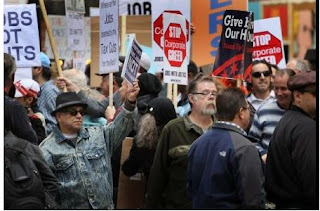
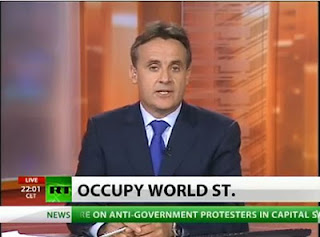
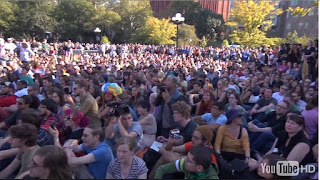
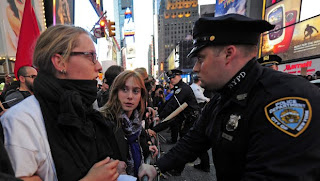

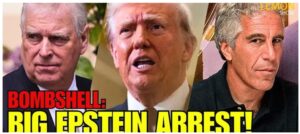
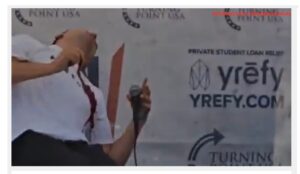
OWS is not COINTELPRO, it's OTPOR/CANVAS.
Google: "ows otpor" and "the revolution business"